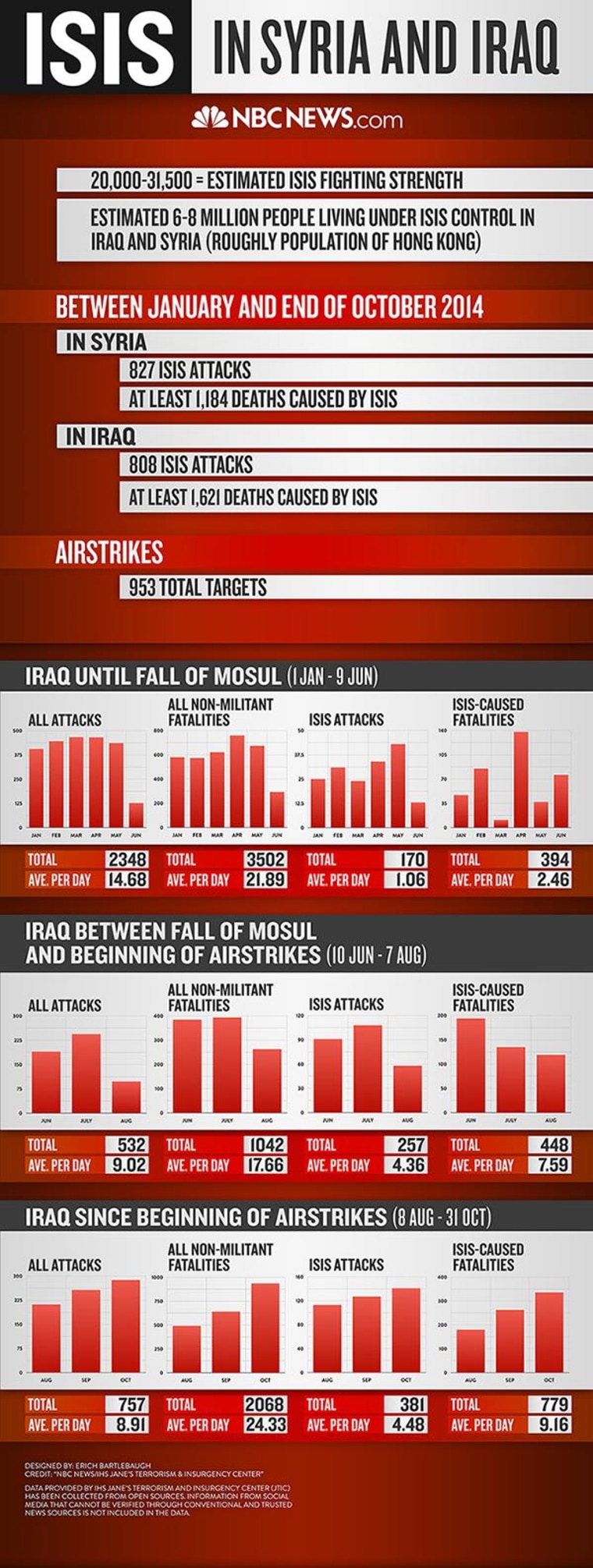LONDON — U.S.-led airstrikes have failed to slow the number of ISIS attacks and its defiant militants are now racking up a higher body count than ever before, according to data provided exclusively to NBC News.
Analysis of IHS Jane's Terrorism and Insurgency Center's (JTIC) database shows the current face — and pace — of the group's battle for Syria and Iraq.
Data showed that ISIS massively stepped up attacks after conquering the Iraqi city of Mosul on June 10 — and has stepped them up further since airstrikes were launched in August. Deaths caused by ISIS also climbed since the key city was overrun and have continued to rise since the U.S.-led coalition started bombing the militants.
“The airstrikes certainly aren’t impairing their ability to intensify their attacks or carry out their campaign,” said Matthew Henman, head of the JTIC. “They’re not cowed by them, they’re not afraid.”
Henman stressed that ISIS is almost certainly responsible for far more violence than the JTIC database can attribute to the group as a result of stringent methodology and verification requirements.
"They’re doing far more than we’re able to ... give them credit for," he said,
By Oct. 31, ISIS has carried out at least 808 attacks in Iraq.
In January — when the group’s efforts were largely focused in Syria, JTIC recorded 25 ISIS attacks in Iraq.
ISIS later launched a full-on offensive to seize broad swaths of territory in northern Iraq. A key turning point in the militants’ push came with the fall of Mosul, Iraq's second-largest city.
"Instead of there being limitations forced on them by airstrikes, they’re the ones that are still calling the shots"
From June — when there were 104 ISIS attacks — operational tempo picked up, with 171 ISIS attacks in the month of August, according to IHS Jane's. Airstrikes were launched on August 8. After a small dip in the numbers in September, ISIS clocked up 141 attacks in October.
Henman said September's reduction could be explained by a brief lull in order to hold ground and consolidate ISIS territory. After that, he said, ISIS just kept going.
The group carried out several large-scale attacks on key Iraqi military installations and ramped up the number of attacks in areas like Anbar Province.
“They have the ability to intensify and de-intensify their operational tempo at will,” Henman said. “Instead of there being limitations forced on them by airstrikes, they’re the ones that are still calling the shots. It’s them that’s dictating the pace, instead of vice versa.”
As the number of ISIS attacks climbed in Iraq, JTIC's database suggests the body count jumped dramatically.
In January, the group was responsible for at least 47 fatalities. Starting in June — the month ISIS unfurled its black banners in Mosul — the monthly death toll inflicted by ISIS has remained in the triple digits. JTIC counted at least 270 ISIS-caused fatalities in June. For the period after the launch of airstrikes, ISIS caused at least 263 deaths in September and then 336 in October.
According to JTIC's database, the average number of attacks carried out by ISIS per day rose 2.75 percent in the two months before the airstrikes began and the first two months and a half of them. The average number of deaths caused by ISIS per day rose 20.7 percent during that same span.
JTIC's statistics appear to back up comments made by ISIS leader Abu Bakr al-Baghdadi in a new audio recording that emerged on Thursday.
“The crusaders’ airstrikes and constant bombardment — day and night — upon the positions of the Islamic State have not prevent its advance, nor weakened its resolve," he said.
The information provided from the IHS Jane's Terrorism and Insurgency Center database was mined from open sources and double-sourced wherever possible to ensure accuracy. It does not include information from social media that cannot be verified through conventional and trusted news sources.
In response to the JTIC statistics, Pentagon Press Secretary Rear Admiral John Kirby said: "We cannot speak to the veracity of this so-called data, but we know — and have been clear — about the effects our strikes and the ground operations of Iraqi security forces have had on ISIL [another name for ISIS]. That pressure will continue."
Jim Miklaszewski of NBC News contributed to this report.
